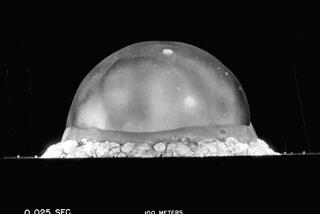CULTURE WATCH : Einstein Is Getting Even More Relative
- Share via
One hundred thirteen years after his birth, Albert Einstein’s influence is found throughout our culture.
His work formed the basis of 20th-Century physics, and his insights led to innumerable technological advances.
But the enigmatic scientist, who was born March 14, 1879 (and who died in 1955), also influenced music, literature, art, philosophy and popular culture.
Demonstrators at an Earth Day observance in Berkeley showed Einstein’s influence with the admonition, “E=mc 2. It’s more than just a good idea, it’s the law.”
Authors from physicist Stephen Hawking to science-fiction writer Larry Niven have used Einstein’s ideas.
Composer Philip Glass has written a minimalist opera, “Einstein on the Beach.” Count Basie penned a musical homage to E=mc 2.
Einstein has also inspired postcards, cartoons, record albums, calendars, T-shirts and books. Even a beach towel bears his wire-haired visage in fluorescent colors.
Although often linked with the creation of nuclear arms, Einstein was a pacifist who supported international control of nuclear arms and believed that scientists should be concerned with the social consequences of their work.
A Jewish refugee from Nazi Germany, he was offered the presidency of Israel but declined.
Although many people consider science to be at odds with spirituality and art, Einstein didn’t. He wrote that “the most beautiful thing we can experience is the mysterious. It is the source of all true art and science.”
More to Read
The biggest entertainment stories
Get our big stories about Hollywood, film, television, music, arts, culture and more right in your inbox as soon as they publish.
You may occasionally receive promotional content from the Los Angeles Times.









